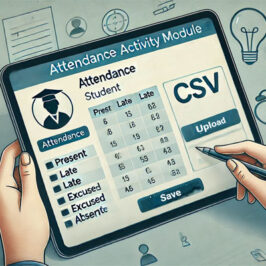The church is one of the most socially connecting groups of people in the world. They meet each week, sometimes even twice a week and are connected through all forms of social connections such as email, telephone, mail, social networks, gathering, study groups and more. It is just natural that Social Media and the church sounds like a match made in heaven.
However, the truth is that churches need to start taking risks and using tools such as Facebook, Blogs, and Twitter to establish connection points with the people they want to reach or help. Just don't let it take a back seat to personal attention and care as these will/should always be the staple in creating strong relationships in a church.
Why Must You Act Now?
The infographic "Churches and Social Media" shows some very interesting statistics. For example, just under half of those churches surveyed said social media is their most effective method of communication. In fact, these churches stated that Social Media (46%) was almost twice as effective for outreach as the next highest strategy, knocking on doors at 24%. With numbers like this, taking a chance obviously pays off. Despite this, most churches are actually slow adopters of the Internet and technology in general. Only 21.5% surveyed were actually innovative and influential when it came to making use of technology.
Whether you are looking for a job or you want to grow your flock, your best results is going to be all about who you know and who knows or has at least heard about (not just of) you. Social interaction is in, paper is out. Customers needs are in, what you have to offer is out.
Get started today. If possible, you'll really want a simple and easy to remember way for people to find and remember your church on Twitter and Facebook. Most people already know that you need to go to www.facebook.com for facebook and www.twitter.com for twitter. However each day more and more churches are joining the Social Media revolution and using up personalized addresses like www.facebook.com/YourChuchesName and www.twitter.com/YourChurchesName. You need to act now before someone else takes your ideal ideal name. Even if you don't start using it today, you'll have it reserve it for the future.
Here are a few suggestions on making effective use of Social Media in your church to enhance communications and your outreach efforts.
Social Media
Start by reading Social Media and the Church (excellent!)
- Use social media consistently and frequently and use it for more than just simple advertising. Ideally you want to post 2-3 times per day. You only need to spend about 5-8 minutes each time. Don't have time? Do it once a day and schedule your other two messages. Doing it less than 3 times per week may not produce any results. Remember, social media is a conversation and you need to show up if you want others to participate.
- To help you save time on social media networks, monitor, schedule your messages and interact with people on Facebook, LinkedIn, Google+ and Twitter, use a free tool like HootSuite. If all you want to do is Tweet, there is also TweetDeck and CoTweet.
- Use social media to engage in conversation, connect with the community, and receive good feedback.
- Create, share and spread content on using your website such as sermons, sermon notes, resources, podcast audio, Christian music, Christian art work. Use Facebook and Twitter to let people know about it.
- Regularly ask people to post their thoughts and encourage them to ask their own questions.
- Every time a person dedicates their life to God, gets married in the church, or does something awesome, tell the world and you church members about it! Just be sure to get their permission first.
- While you may want to be careful on what details you provide, you can ask your followers to pray for a specific need or person or just offer a short daily prayer people can read and feel energized by.
- Why not drop a link into your conversation and let people know you have a new sermon or message uploaded so they can listen or watch if they missed it?
- People in your community will probably be on Facebook and Twitter and you can begin conversations on pressing needs in your town, schools, or other churches. You can discuss anything from social issues to religion to sports…all great things for building trust and building your church “brand”.
- Measure your effectiveness. Run your attendance numbers against your campaign numbers to track effectiveness so that you can focus your time and effort on what is getting results.
- Appoint a member of your congregation as a Marketing Director for your church which includes Facebook, Twitter, email campaigns, community ads, posting of signs and posters on lawns and poles, and your website. If you can, ALSO appoint a small team to spread the workload and help come up with ideas.
- Post messages on other peoples Facebook, Twitter or Blog pages with a link back to the church in response to someone else's message. This will increase visibility of the church.
- Announce your Facebook and Twitter pages regularly in your weekly bulletin, newsletters and on the bulletin board and washroom wall (for when people are tweeting). Make good use of official Facebook and Twitter logos. These guys have done a lot of work to create a recognizable brand - use it!
- What should you talk about? If you want people to feel connected, keep it relevant to their lives and what is happening in their world. While Google News will tell you what's happening in the world and even locally, check out trends on Twitter to find out what people actually care about. Need to find a way to make your sermon relevant to the lives of your congregants? Use Twitter Search to do a little research.
- Social Media need not be limited to just communicating with current and future congregants. You can also have special interest networks to communicate with other ministers, the council or to coordinate special projects.
- Social Media and Marketing need not be expensive. In fact, the following sites are actually free! Facebook, Twitter, Google+, LinkedIn, YouTube, none of these will cost you a cent. Can't afford a website? Get started at WordPress.com for free. You can always move your pages and posts to a more permanent self-hosted version of WordPress.org which offers much more flexibility at a later date when membership and attendance starts to go up and you can afford it.
- Be patient. Be consistent for at least a month. Remember, it takes time for people to discover your new efforts and even more time for them to feel comfortable enough to start participating.
Make a small change each day and they will grow to make a big difference tomorrow.
Facebook Pages (The Church's "Fan Page" - Not your personal page!)
Facebook Pages are a great way to connect with your congregation, people who are already connected with your church. You can have a public profile for your church and/or just keep for your members.
Here are a few ideas on how you can make use of Facebook for your church:
- Create a Username for your page. This will:
1) Show that messages are coming from this person or organization and
2) Allow you to create a custom Facebook address like www.facebook.com/YourChurchName that you can advertise. - Create a public Facebook events. Members will be able to easily invite people in their friends list to the event. Just be sure to include all the relevant information. You can sometimes make assumptions within the congregation that they know where the church is or when Sunday morning service is usually held but visitors might not. Who, What, Where, When, Why, How and special notes that people need to know should always be included.
- Post behind the scenes videos and pictures. Build up the anticipation of an upcoming event by sharing work being done in preparation.
- While you may want to be careful on what details you provide, you can ask your followers to pray for a specific need or person or just offer a short daily prayer people can read and feel energized by.
- You can easily keep your congregation or church members informed of planned gatherings (or even spontaneous get together’s) by sending updates or use it to invite people to church in a non-threatening way?
- Alert congregation when a member is in crisis and in need.
- Post sermon notes, things that you wished you had said during your sermon and encourage people to offer constructive criticism of your sermon. If you don't know there is a problem, how could you possibly address it?
- Share resources throughout the week.
- Be creative in the use of the facebook banner. A lot of people think that this has to be used for the name of your church. Here is an example of a church's page that uses it to advertise their next upcoming event.
Use Twitter to connect with those in the community who have never been to the church and to encourage interactive discussions relating to specific events amongst your members.
- "Tweeting is to preaching what the book of Proverbs is to the book of Romans." (John Piper) - Share God's wisdom.
- Use Twitter in the middle of Sunday services so that people can ask questions, etc, and respond as part of the teaching time. To filter out noise, print a specific #hashtag in the bulletin or post it on a wall.
- Create audio recordings of your sermons and publish them on Twitter the moment you are finished presenting it during the during the service. Look for an app on iTunes or the Play Store that will help you do this.
- Invite the congregation to tweet sermon notes, quotes and ask questions using a specific #hashtag. This not only helps others as they take notes during the message, but is a great way to show each member’s followers what’s happening at the church each Sunday.
- Share a link in Twitter each day to share a new bible passage and encourage a discussion.
- Have the pastor consistently get on Twitter at the same time each week on Sunday or Monday to respond to tweets from the past week and engage people in live chats. Don't get discouraged at first if people don't show up. Be there just in case and keep tweeting about it. People will eventually start planning on being there.
- Special Events, but especially youth events like Vacation Bible School (VBS), Youth Group outings - Tweet photos as it's happening for parents to see how much fun their kids are having. Be sure to included a photo release consent clause or form in your registration package clearly indicating the intended use of the photos. It can be as simple as having a box that needs to be checked if they DON'T want their child to be photographed. If the odd parent prefers not to have photos taken of their child, have the child wear a bright colour ribbon or other special (but not embarrassing) visible indicator to ensure anyone taking photos keeps the child out of the photos.
Blogs
While you can certainly post some information on social media sites, Pastors should be encouraged to usa a blog to share their thought and ideas when it simply can't be express in 140 characters or less. It's also a great place to post articles such as this. You can always post a short message on Facebook and Twitter inviting people to go to your blog.
Add Social Media "Like" icons to your blog. They are available for most social media sites. When people click the icon, it posts a brief message on their social media site to let friends know they found something they liked. Search engines are picking up o these up and starting to evaluate the value (or ranking) of your site in search results. The more people like your website, blog or article pages, the more popular it assumes your site must be.
QR Codes
- Post a QR code in your bulletin, on the wall and on a sign outside the church. Don't say what it's for and change it weekly. Depending on what it is, you can add something like "Do you really understand what God is saying? Come on in to find out.", "Thought for this week...", "Did you know?" or some other caption. See if people will scan it with their phone just to find out. It can be a message, a link, a positive motivational bible verse or a reminder for an upcoming event.
- QR codes are relatively new to many people. Make sure to have instructions on how to do this readily available and always have it point to something on your website so that you can a) easily change it and b) measure your success with website statistics.
- While Email lacks in interactive opportunities of social media and statistically less effective than social media these days, there are still opportunities to be found from using it. Consider using a mass email distribution system like MailChimp (free for 2,000 subscribers and up to 12,000 per month) to send out and monitor mass email campaigns. Warning: Be sure to read clause 11 of MailChim's Terms of Use regarding Anti-Spam and Abuse Related Rules. Most similar services have something similar. Don't just include every email address you ever came across. Your account will be disabled if more than a a certain percentage of the email addresses bounce or if you get complaints about spam. The best way to build your mailing list is to have people sign up through an Opt-in subscription form that you can create though Mailchimp. There are even plugins available for WordPress to help you integrate it into your website or blog. Also note that Canada recently also passed anti-spam laws but has not yet started to enforce them. You'll definitely want to read-up on this as there are legal implications which will be going into force in late fall of 2012 or winter 2013. The Canadian legislation is designed to be one of the most stringent anti-SPAM regimes in the world and imposes significant restrictions on the use of electronic messages to carry out commercial activities.
- Create a weekly devotional email list that people can subscribe to. In each email, be sure to always include a link back to the website, your facebook and twitter pages and contact information for your Sunday service. No email should ever go out without a clear call to action.
- Automatically include a link to your website in all your emails. Also take the opportunity to mention a upcoming events, even if it is just in a sidebar.
- Even if you don't currently have anything to email people about, add a "Subscribe to Our Mailing list" form on your home page. You'll appreciate it down the road when you eventually have something to say and decide that you wished you had a mailing list available.
- Design a standardized signature block for all members of the church council. Any official emails going around on behalf of the church should include a customized version of it with the persons name, title and contact information.
SMS
- Keep in mind that some people pay on a per-message received basis so only put people on your SMS distribution list with their permission or your efforts will may against you.
- Send out a mid-week SMS text message to encourage and inspire.
See Church Social Media, a Canadian site that has regular conversations on the use of Social Media in the Church. They also have a Twitter-based chat each Tuesday at 9:00 PM (Eastern Time) which is open to all denominations.
Don't know how?Don't worry, you'll figure it out. Don't be afraid to let people know what your challenges are. When you declare it, you become helpable. Don't let perfection turn into procrastination. Just get out there and do it and make it happen! Don't be part of the 95% of people out there who failed because they either didn't start or gave up not realizing just how close they were to succeeding.
A relationships in a congregation and a church are like any living being whether it is a person, plant, animal or even bacteria. It is either growing or dying. As long as your church is growing, you are heading in the right direction. Just be sure to pay attention to what works and what doesn't and make small course corrections over time as you learn. Find others who are succeeding and notice what they are doing. Success leaves clues.
The world is going mobile - it's a fact. Even if your website isn't ready for it, social media is already here. It's an easy way to connect with your congregation and those looking for your congregation.
Share your Church's Social Media success story below!
Additional Information







Lawson Hembree
Thanks for the shoutout to my blog post!
You make some great points about social media and the church as well. I especially like the point about appointing a member as a social media manager: this takes the stress and distraction away from the pastoral staff and let’s a social media nerd (like me!) use his/her interests to edify the local body.
Michael Milette
Thank you for your feedback Lawson. Your blog post actually inspired me to compile this list. We each have our strengths and our weaknesses. Why try to force a square peg into a round hole?